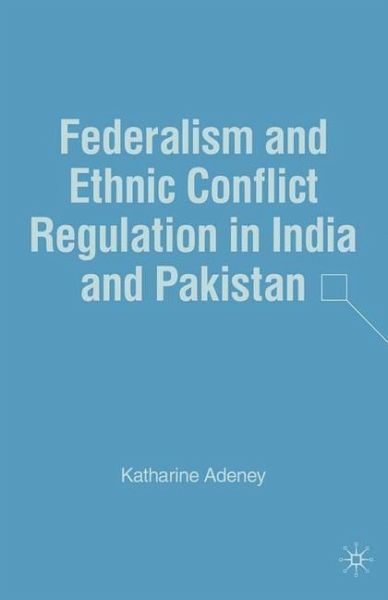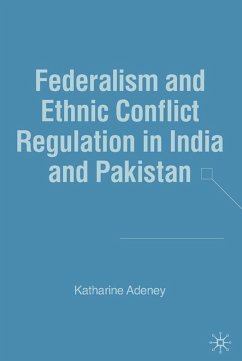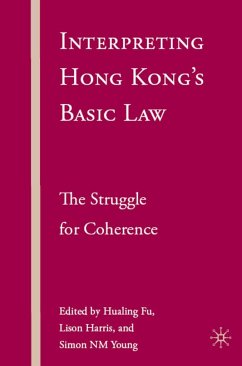
Katharine Adeney
Broschiertes Buch
Federalism and Ethnic Conflict Regulation in India and Pakistan
Versandkostenfrei!
Versandfertig in 6-10 Tagen
Weitere Ausgaben:

PAYBACK Punkte
19 °P sammeln!





Katharine Adeney demonstrates that institutional design is the most important explanatory variable in understanding the different intensity and types of conflict in the two countries rather than the role of religion. Adeney examines the extent to which previous constitutional choices explain current day conflicts.
KATHARINE ADENEY is a Senior Lecturer in Politics at the University of Sheffield, UK.
Produktdetails
- Verlag: Palgrave Macmillan / Palgrave Macmillan US / Springer Palgrave Macmillan
- Artikelnr. des Verlages: 978-1-349-99953-8
- 1st ed. 2007
- Seitenzahl: 260
- Erscheinungstermin: 6. Juni 2007
- Englisch
- Abmessung: 216mm x 140mm x 15mm
- Gewicht: 332g
- ISBN-13: 9781349999538
- ISBN-10: 1349999539
- Artikelnr.: 44552359
Herstellerkennzeichnung
Palgrave Macmillan
Tiergartenstr. 17
69121 Heidelberg
ProductSafety@springernature.com
"Katharine Adeney's book sets a new standard in the literature on comparative federalism and South Asian studies...The book's impressive empirical underpinnings will be invaluable in predicting the expected levels of federal stability in India and Pakistan." - Lawrence Saez, Political Studies Review
"This book breaks new ground . . . Adeney's conclusions are particularly instructive to both practitioners and federalism think-tanks currently contemplating the institutionalisation of federalism in states like Sri Lanka, Iraq, Nepal and Afghanistan." - Contemporary South Asia
"Katharine Adeney has written a book of exceptional analytical clarity. Theoretically sophisticated and empirically rich, this study moves beyond the
"This book breaks new ground . . . Adeney's conclusions are particularly instructive to both practitioners and federalism think-tanks currently contemplating the institutionalisation of federalism in states like Sri Lanka, Iraq, Nepal and Afghanistan." - Contemporary South Asia
"Katharine Adeney has written a book of exceptional analytical clarity. Theoretically sophisticated and empirically rich, this study moves beyond the
Mehr anzeigen
tired clichés that have afflicted much of the comparative scholarship on India and Pakistan. Explaining why federal structures are sometimes able to manage diversity (and sometimes not), Adeney provides an original and historically informed account of institutions as both cause and effect - as a reflection of social realities as well as key determinants of political behavior. This is a book of significance well beyond South Asian studies." - Robert Jenkins, Professor of Political Science, Birkbeck College, University of London
"Katharine Adeney's searching and finely nuanced study argues that federalism and consociationalism take many forms. Their achievement as strategies for dealing with ethnic conflict varies with context. Her historically informed analysis makes an important contribution to our understanding of federalism and consociationalism in general, while the particular cases, India's relative success and Pakistan's relative failure, illuminate the contextual quality of causality." - Susanne Hoeber Rudolph, Professor of Political Science Emerita, University of Chicago
"Katharine Adeney's book deserves an enthusiastic welcome for several reasons. Comparative research on Pakistan and India is a rarity - and it is rarer still to see analyses that are as penetrating and dispassionate as this one. Her discussion of 'ethnic' conflict is extremely valuable because - unlike many that have recently appeared - it breaks 'ethnicity' down into linguistic and religious dimensions. And it also demonstrates that what sometimes appear to be 'ethnic' conflicts are actually rooted in disputes over material issues, such as the control of resources. Finally, this is a major and subtle contribution to the literature on comparative federalism. It is unusual for a book - especially a first book - to enrich our understanding on so many fronts; but that is what this one does." - James Manor, Institute of Development Studies, University of Sussex
"Adeney's astute comparison of India and Pakistan is an important addition to the literature explaining that institutions matter to the democratic health of the countries that adopt them." - Donald L. Horowitz, James B. Duke Professor of Law and Political Science, Duke University
"Katharine Adeney's searching and finely nuanced study argues that federalism and consociationalism take many forms. Their achievement as strategies for dealing with ethnic conflict varies with context. Her historically informed analysis makes an important contribution to our understanding of federalism and consociationalism in general, while the particular cases, India's relative success and Pakistan's relative failure, illuminate the contextual quality of causality." - Susanne Hoeber Rudolph, Professor of Political Science Emerita, University of Chicago
"Katharine Adeney's book deserves an enthusiastic welcome for several reasons. Comparative research on Pakistan and India is a rarity - and it is rarer still to see analyses that are as penetrating and dispassionate as this one. Her discussion of 'ethnic' conflict is extremely valuable because - unlike many that have recently appeared - it breaks 'ethnicity' down into linguistic and religious dimensions. And it also demonstrates that what sometimes appear to be 'ethnic' conflicts are actually rooted in disputes over material issues, such as the control of resources. Finally, this is a major and subtle contribution to the literature on comparative federalism. It is unusual for a book - especially a first book - to enrich our understanding on so many fronts; but that is what this one does." - James Manor, Institute of Development Studies, University of Sussex
"Adeney's astute comparison of India and Pakistan is an important addition to the literature explaining that institutions matter to the democratic health of the countries that adopt them." - Donald L. Horowitz, James B. Duke Professor of Law and Political Science, Duke University
Schließen
Für dieses Produkt wurde noch keine Bewertung abgegeben. Wir würden uns sehr freuen, wenn du die erste Bewertung schreibst!
Eine Bewertung schreiben
Eine Bewertung schreiben
Andere Kunden interessierten sich für











